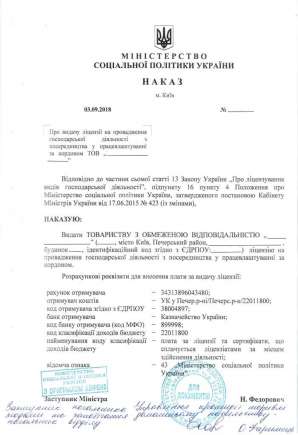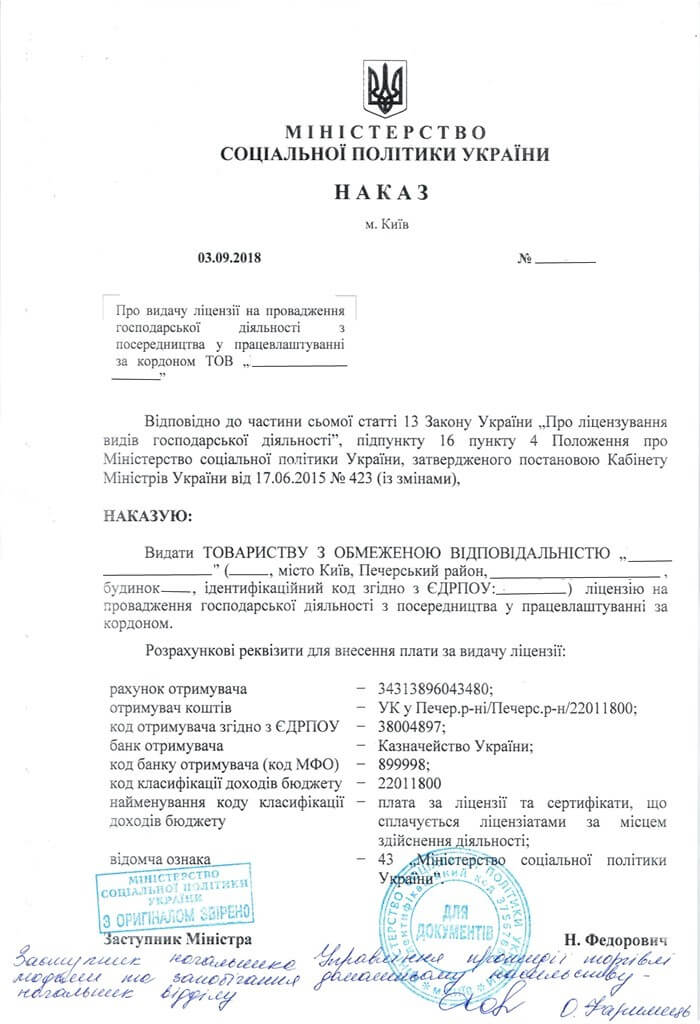How not to lose a foreign partner when mediating in employment abroad?
Cost of services:
Reviews of our Clients
... our work on joint projects assured us of your high level of professionalism
We were contacted by a Client intending to conduct activities related to the provision of intermediary services for employment of Ukrainian citizens abroad in the United States. The Client already had a license, but he wanted to conclude agreements with another foreign partner.
The organization of this activity had to be as transparent as possible, in terms of our legislation, and comply with all licensing conditions. The difficulty was in building work with American partners - the intermediary company and employers. For them the requirements of our legislation seemed too complicated and bureaucratic. American partners wanted to minimize and simplify the amount of information and documents required for us in the process of obtaining a license and further work with the Client.
At the same time our Client had risks: either the risk of having the license revoked by the licensing authority and possible fines, or the inability to work with the desired foreign partner.
Today, we will talk about how to regulate relations with a foreign partner when working as an employment broker.
You may also like: Development of Documents for a Foreign Partner in Ukraine
Why is it so important that a foreign partner meets Ukrainian requirements?
According to the licensing regulations for such activities, our Client must, among other things, conclude a foreign economic agreement (FEA) (contract) with a foreign entity (company), which will provide overseas employment mediation services, namely to place our citizens with American employers. The terms of this contract must meet the requirements of Ukrainian law.
The Client must also keep copies of all documents and contracts that have been submitted to the licensing authority, for the duration of the license. This also applies to copies of all employment contracts between job applicants and foreign employers, even for 3 years after the expiration of these contracts.
In addition to the FEA with the foreign partner, the licensee must have employment contracts between all candidates and the foreign employers - which are more than 20 different U.S. companies. The terms and conditions of employment in American companies must be reflected in the employment contracts, and fully comply with the conditions specified in the draft employment contract, submitted to the licensing authority. Such a draft is approved by the licensing authority at the licensing stage.
In addition, in order to verify the activity, the licensee must submit to the licensing authority a copy of the certified document or an excerpt from it, which proves the legal relationship between the American employer and the American employment mediator.
It is also the responsibility of our Client to keep a record of all applicants and their employment contracts in the appropriate register and to inform the licensing authority about it.
It is impossible to obtain and even approve most draft documents without a foreign partner. Here its direct participation is required. If the partner refuses to cooperate, you will find yourself without the necessary documents, and most likely will not even be able to obtain a license. Or lose it at the first inspection.
You may also like: How to Find a Foreign Partner for an Overseas Employment License?
Why can a foreign partner refuse to provide the necessary documents?
When working with an American foreign partner, our Client immediately encountered a number of problems.
First, all foreign companies are very sensitive to their confidential information (trade secrets), and before entering into a business relationship, they conclude a Non-disclosure Agreement (NDA) with the party to whom they disclose commercial information. You can read more about this Agreement here.
And in this case foreign employment agency did not want our Client (licensee) to disclose information about employers and terms of cooperation with them, as well as provide any documents disclosing their commercial information.
Secondly, all foreign companies, and in particular employers in the USA with whom the foreign mediator works, conclude the Job Offer with employees. This job offer is not the employment contract, and does not protect the rights and interests of employees, and therefore does not meet the requirements of Ukrainian legislation.
Thirdly, one of the foreign mediator’s requirements was that the terms of the Job Offer Agreement between our Client (licensee) and job candidates must comply with the local legislation at the place of registration of the American company.
The difficulty was that the candidate cannot pay for employment mediation services - according to the local American law it is the employer who pays for it. Which is contrary to our legislation, according to which candidates have to pay for mediation services after signing the employment contract and the act of services rendered.
Our Client specifically wanted to work with this mediator, as it is quite a large foreign company that works with many employers in the U.S. Our task was to find the most compromise solutions that would meet the needs of all three parties, while not violating the laws of Ukraine.
You may also like: How to Start a Model Agency?
How did we propose to settle with a foreign partner to successfully conduct employment activity in the United States?
To confirm the legal relationship between a foreign employer and a foreign mediator, it is sufficient to provide the licensing authority with an excerpt from a document certified by the mediator, namely from the FEA (contract). It must indicate only the parties to this contract, the subject of the contract and its terms. No information concerning the terms of their cooperation.
We suggested taking this path, since it allowed the licensee to confirm the legal relationship with foreign companies, and they, in turn, could maintain trade secrets, in particular, the terms of cooperation.
As for the candidates' payment to the licensee, we made sure that the parties agreed and fixed the following in the Contract: The payment for providing employment mediation services according to the Contract is made by the foreign mediator on behalf of the candidate. Payment according to the Contract shall be made after the parties sign the Contract and the act of services rendered. The performance of the terms of this contract with respect to payment by a third party not a party to this contract does not entail the replacement of the debtor in the obligation as a whole, and if the candidate fails to perform the duties of the other person, this obligation must be performed by the candidate.
In such a case, the contract retained the terms of the fee, complied with the licensing regulations, and the local law of the foreign parties, since the payment for services was not made by the candidate.
As for the Job Offer and the employment contract, we needed to clarify the following: Can a JOB OFFER replace the employment contract?
Representatives of the Ministry of Economy of Ukraine, which is the controlling body of the licensee's activity, fundamentally disagreed with this. Moreover, in order to strengthen the protection of the rights of our citizens working abroad, the Ministry of Economy checks the terms of employment contracts with foreign employers very carefully for their compliance with our legislation and to ensure maximum protection of the rights and interests of our citizens before a foreign employer.
Therefore, the template of the offer that American companies worked with had to be supplemented as much as possible with the key points (conditions) on which it would comply with the essential terms and conditions of the employment contract. We suggested adding the following provisions to the offer:
- term of the contract;
- working conditions;
- rights and obligations of the employee;
- conditions of termination of the contract;
- living conditions of the employee, his/her safety;
- employer's liability;
- conditions of vacation and sick pay;
- ensuring repatriation of the employee by the employer, etc.
This employment contract retained as much as possible the JOB OFFER form used by the foreign employer.
In this way, we were able to comply with the legal requirements of all parties, and to settle conflicts with our Client’s foreign partner.
Since the addition of a new foreign partner involves an amendment to the license, we took care of the entire organization of this process. Read more here.
Do you need help for a safe start as a foreign employment mediator? Don’t hesitate to contact us! We will help you solve even the most difficult issues and take care of the successful start of your business.
Didn’t find an answer to your question?
Everything about getting an Overseas Employment Agency License here.
Our clients






